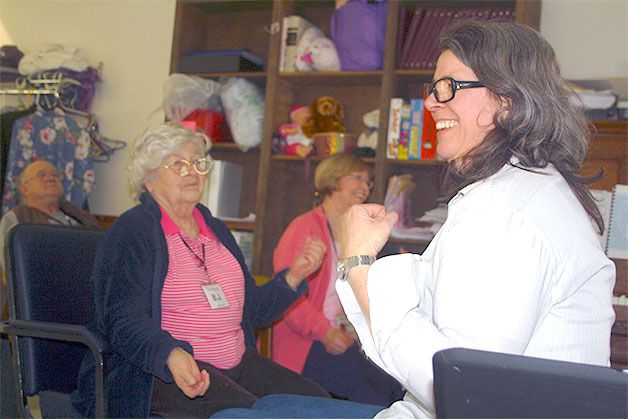Caring for a loved one with dementia is a 24-hour job that is not easy.
Between proofing a home against hazards like stairs and helping the person with dementia take care of even the simplest of tasks, it’s a huge job to take on at home.
But according to the Alzheimer’s Association, about 70 percent of people with Alzheimer’s or other dementia-related illnesses are cared for at home.
“Some people keep their loved ones home with them throughout the journey of dementia,” said Hestia Laitala, director of Time Together Adult Day Services in Bayview.
She said that there are many different options caregivers have, such as professional visits to them at home, adult day programs or, if they choose, long-term care in a facility.
Time Together is one of those adult day programs, a social program in which about half the people have dementia or Alzheimer’s.
“It’s a four-hour, structured program in which people get to be with their peers,” Laitala said. “They get to have social interaction outside of their home, outside of the very small world that gets created when you are being cared for with one caregiver.”
Adult day programs offer caregivers not only support, but also a brief respite during which they can have a break and take care of themselves.
“Reach out to the community for support,” Laitala said. “Don’t try to do it alone. Recognize how important it is that you are taking care of yourself as a caregiver because it’s draining, it’s challenging, and a lot of people are trying to do it alone.
“Don’t think that you have to do this alone, and know that there are resources.”
Karen Cowgill, marketing director at HomePlace in Oak Harbor, a long-term care facility that caters to people with Alzheimer’s and dementia-related illnesses, said that one of the challenges with taking care of loved ones in these situations is that the caregiver doesn’t always take care of themselves.
“It is a 24-hour, seven-days-a-week responsibility, and it can become very overwhelming,” Cowgill said.
Because so much care and attention is given to their “person,” Cowgill said, caregivers often don’t eat very well and don’t get enough sleep at night, since their person can wake up often throughout the night.
“You’re draining your own physical well-being to care for your person,” she said.
Cowgill also runs two Alzheimer’s support groups and says caregivers need to reach out to others for help.
“They need to know that there are places and people that can help them, that they are not alone,” Cowgill said. “They need to share with their churches, their family members, friends that they do need help.”
Cowgill also recommends caregivers find local resources, not just adult day services or support groups, but also long-term facilities, just in case. She said sometimes the caregiver or their person has a health scare that requires heightened care, making the at-home situation impossible at the time. It’s better to know the options ahead of time instead of needing to scramble to find a place.
But even with all the challenges, the Alzheimer’s Association stated that in 2013, the most recent year of data, more than 15 million people provided unpaid, at-home care for people with Alzheimer’s.
“It’s their loved one,” Laitala said. “You want to do the best you can for the person in your life.”
“They find (it) rewarding that they are able to do it, even if it’s for the short term,” Cowgill said.
But Cowgill said the main thing for caregivers to remember is “they’re not alone.”
“They’re not going down a road that other people have not gone down before,” she said. “Don’t be afraid to ask for help.”
For information about Alzheimer’s, visit www.alz.org To learn more about caring for loved ones with dementia-related illnesses, contact Senior Services of Island County at 360-321-1600.



